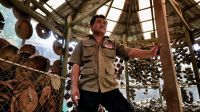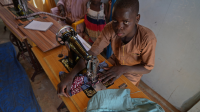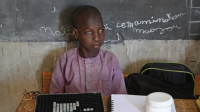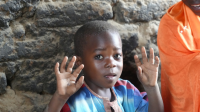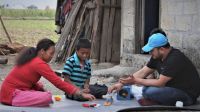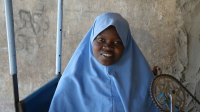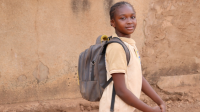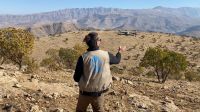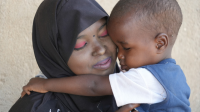By country
By activity
- Rights (87)
- Emergency (587)
- Rehabilitation (392)
- Prevention (80)
- Inclusion (229)
- Health (156)
- Explosive weapons (310)
- Event (13)
- Covid-19 (5)
By publication date
Living with brittle bone disease, Venezuelan refugee pursues her dreams 07/27/23
Michelle is a teenager with brittle bone disease. She came to Colombia looking for medical care. An adapted wheelchair has helped her pursue her dreams.
- Colombia
Typhoon Doksuri (Egay) hits the Philippines 07/27/23
Super Typhoon Doksuri slammed the northern Philippines on Wednesday, July 26, killing at least 5 people and displacing nearly 27,000. Humanity & Inclusion is assessing the situation.
- Philippines
Dedicating his life to mine clearance: the journey of Aki Ra, a former child soldier 07/26/23
13 years after the trial of “Comrade Duch,” the Khmer Rouge torturer convicted of crimes against humanity, a former child soldier turned deminer tells his story.
- Cambodia
Economic inclusion at HI 07/25/23
In 2022, Humanity & Inclusion operated 75 projects on economic inclusion, including in Niger and Madagascar.
- Mali
- Niger
- Madagascar
Frostbitten in a cellar, hiding from bombs in Ukraine 07/12/23
Vadim spent the winter hiding in a cellar in Bakhmut, where the deadliest battle of the war in Ukraine was waged. He developed severe frostbite in his legs, requiring amputations.
- Ukraine
Souleymane wants children with disabilities like him to access education 07/06/23
Souleymane, who has a visual disability, is studying with adapted teaching materials supplied by Humanity & Inclusion. When he grows up, he dreams of becoming a teacher and making schools more inclusive.
- Niger
After airstrike spinal injury, Fatima dreams of walking again 06/28/23
Fatima Ahmed Arj, 20, was paralyzed from the waist down after her family’s apartment in west Mosul was hit by an airstrike in March 2017, causing damage to her spine.
- Iraq
Yacouba overcomes the effects of malnutrition with stimulation therapy 06/27/23
Due to malnutrition, 2-year-old Yacouba had lost the ability to walk. Humanity & Inclusion's stimulation therapy sessions have made him more independent, much to the delight of his whole family.
- Niger
Living with autism, Milan receives at-home education support 06/26/23
Milan, 12, has autism. He lives with his family in southern Nepal. Thanks to Humanity & Inclusion's "Inclusive Futures" project, he is finally receiving the support he needs.
- Nepal
In Niger, Roumanatou wants to become a role model for others 06/23/23
At 21, Roumanatou feels confident about the future. With support from Humanity & Inclusion, she is studying hard to become a strong, independent woman.
- Niger
Shot seeking safety, Rohingya boy receives his first artificial limb 06/22/23
After being shot as he fled to Bangladesh, 12-year-old Rohingya refugee, Jubair, was hoping for just one thing: to play soccer on his own two feet.
- Bangladesh
- Myanmar
In Burkina Faso, Perpétue walks again with her artificial leg 06/21/23
In Burkina Faso, Perpétue has rediscovered the pleasures of going to school and walking with her friends, thanks to the artificial limb she received with Humanity & Inclusion's support.
- Burkina Faso
The power of small drones in humanitarian demining 06/19/23
Humanity & Inclusion will attend the International Meeting of Mine Action National Directors and United Nations Advisers on June 22-23, 2023, in Geneva, Switzerland.
- Iraq
- Syria
- Laos
- Colombia
- Senegal
Thanks to stimulation therapy, Mohamed is walking like a big boy! 06/15/23
Azima and her son, Mohamed, are participating in Humanity & Inclusion's stimulation therapy sessions in Safo, Niger. As a result of this support, the little boy can finally sit up and walk on his own.
- Niger
Promoting inclusive sexual and reproductive health for young people 06/15/23
With the ENSEMBLE project and the support of the Togolese government, Humanity & Inclusion is implementing actions to promote sexual and reproductive health, particularly among women and young people.
- Togo




